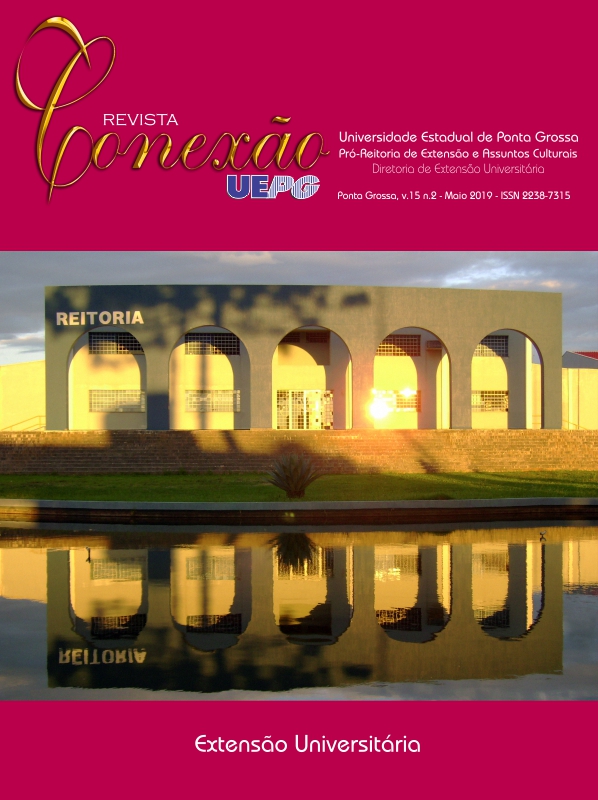O REFORÇO ESCOLAR NA ESCOLA PÚBLICA MUNICIPAL – RELATO DE EXPERIÊNCIA
DOI:
https://doi.org/10.5212/Rev.Conexao.v.15.i2.0007Schlagworte:
Reforço Escolar, Dificuldades de Aprendizagem, Educação.Abstract
O projeto de extensão teve o objetivo de implantar um sistema de reforço escolar para alunos do 2º e 3º ano da Escola Pública Antônio Guedes que apresentavam rendimento insatisfatório ou dificuldades de aprendizagem. As atividades desenvolvidas consistiram em esclarecer dúvidas, preparar exercícios de verificação, dar aulas de reforço e orientar na execução de atividades passadas pelo professor. Foram usados: jogos educativos e dominós, livros didáticos, ditado de palavras, cartilha da tabuada e softwares livres educacionais. Os participantes comentaram que gostaram das atividades de reforço, perfazendo um percentual de satisfação de 100%. As principais justificativas apresentadas: a participação nas atividades trazia um melhor aprendizado; aprendiam, sobretudo, a ler e escrever; e que gostavam da “Tia”, no caso, as universitárias extensionistas. Segundo as professoras, a experiência demonstrou que houve uma melhora no rendimento em português e matemática, bem como na participação em sala de aula e realização das tarefas.
Downloads
Literaturhinweise
BRASIL. Lei nº 8.069, de 13 de julho de 1990. Dispõe sobre o Estatuto da Criança e do Adolescente e dá outras providências. Diário Oficial da União, Brasília, DF, 16 jul.1990. Disponível em: <http://www.planalto.gov.br/ccivil_03/Leis/l8069.htm>. Acesso em: 20 maio 2018.
______. Lei nº 9.394, de 20 de dezembro de 1996. Estabelece as Diretrizes e Bases da Educação Nacional. Diário Oficial da União, Brasília, DF, 23 dez. 1996. Disponível em: <https://www.planalto.gov.br/ccivil_03/LEIS/L9394.htm#art32>. Acesso em: 20 maio 2018.
______. Lei nº 11.274, de 6 de fevereiro de 2006. Altera a redação dos arts. 29, 30, 32 e 87 da Lei no 9.394, de 20 de dezembro de 1996, que estabelece as diretrizes e bases da educação nacional, dispondo sobre a duração de 9 (nove) anos para o ensino fundamental, com matrícula obrigatória a partir dos 6 (seis) anos de idade. Diário Oficial da União, Brasília, DF, 07 fev. 2006. Disponível em: <https://www.planalto.gov.br/ccivil_03/_Ato2004-2006/2006/Lei/L11274.htm>. Acesso em: 20 maio 2018.
CÂNDIDO, F. F. Práticas pedagógicas e inovação na instituição de ensino: uma abordagem psicopedagógica com foco na aprendizagem. Revista Psicopedagogia, v. 27,83 ed., p. 262-272, maio/ago. 2010.
COLL, C.; MARCHESI, A.; PALACIOS, J. Desenvolvimento psicológico e educação. 2. ed. São Paulo: Artmed, 2004.
ESQUINCALHA, A. da C. Letramento matemático de alunos com baixo desempenho por meio de reforço escolar. In: ENCONTRO NACIONAL DE EDUCAÇÃO MATEMÁTICA, 11., 2013, Curitiba. Anais ... Curitiba: SBEM, 2013, p. 01-07.
HEIDRICH, G. A escola da família. Gestão Escolar, 3. ed., ago./set. 2009. Disponível em: <http://gestaoescolar.abril.com.br/comunidade/escola-familia-493363.shtml>. Acesso em: 20 maio 2018.
INEP. Instituto Nacional de Estudos e Pesquisas Educacionais Anísio Teixeira. O que é o PISA. Brasília. 2013a. Disponível em:
<http://portal.inep.gov.br/pisa-programa-internacional-de-avaliacao-de-alunos>. Acesso em: 19 maio 2018.
______. Resultados PISA 2000 - 2012. Brasília. 2013b. Disponível em:
<http://download.inep.gov.br/acoes_internacionais/pisa/resultados/2015/resultados_pisa_2000_2012.pdf>. Acesso em: 19 maio 2018.
______. Brasil no PISA 2015: análises e reflexões sobre o desempenho dos estudantes brasileiros. Brasília, DF. 2016. Disponível em: <http://download.inep.gov.br/acoes_internacionais/pisa/resultados/2015/pisa2015_completo_final_baixa.pdf>. Acesso em: 19 maio 2018.
______. Sistema de Avaliação da Educação Básica Avaliação Nacional da Alfabetização. Edição 2016. Brasília, DF. 2017. Disponível em: <http://portal.mec.gov.br/index.php?option=com_docman&view=download&alias=75181-resultados-ana-2016-pdf&category_slug=outubro-2017-pdf&Itemid=30192>. Acesso em: 18 maio 2018.
KRAMER, S. Alfabetização, leitura e escrita: Formação de professores em curso. Rio de Janeiro: Papéis e Cópias de Botafogo e Escola de Professores, 1995.
MONTEIRO, D. C.; SBOROWSKI, L. R. Dificuldades no processo de alfabetização: uma questão metodológica. Revista Uniara, Araraquara, v. 19, p. 153-162, 2006.
PERIUS, J. K. Dificuldade de ensino e aprendizagem: um estudo na sala de reforço. REP’s - Revista Eventos Pedagógicos, v. 8, n. 2,22.ed.,_p. 847-862, ago./dez. 2017.
SOARES, M. R. Z.; SOUZA, S. R.; MARINHO, M. L. Envolvimento dos pais: incentivo à habilidade de estudo em crianças. Estudos de Psicologia, Campinas, v. 21, n. 3, p. 253-260, set./dez. 2004.
TIBA, I. Ensinar aprendendo. 18. ed. São Paulo: Integrare, 2006.
ZIBETTI, M. L. T.; PANSINI, F.; SOUZA, F. L. F de. Reforço escolar: espaço de superação ou de manutenção das dificuldades escolares? Psicologia Escolar e Educacional, Maringá, v. 16, n. 2, p. 237-246, jul./dez. 2012.
Downloads
Veröffentlicht
Ausgabe
Rubrik
Lizenz
a) Os autores mantêm os direitos autorais e concedem à revista o direito de primeira publicação, com o trabalho simultaneamente licenciado sob a Creative Commons Attribution License que permite o compartilhamento do trabalho com reconhecimento da sua autoria e publicação inicial nesta revista.
b) Ao submeter um artigo à Revista Conexão UEPG e tê-lo aprovado os autores concordam em ceder, sem remuneração, os seguintes direitos à Revista: os direitos de primeira publicação e a permissão para que a Revista redistribua esse artigo e seus metadados aos serviços de indexação e referência que seus editores julguem apropriados.
c) Os leitores são livres para transferir, imprimir e utilizar os artigos publicados na Revista, desde que haja sempre menção explícita ao(s) autor (es) e à Revista Conexão UEPG e que não haja qualquer alteração no trabalho original. Qualquer outro uso dos textos precisa ser aprovado pelo(s) autor (es) e pela Revista.

Este obra está licenciado com uma Licença Creative Commons Atribuição 4.0 Internacional.





